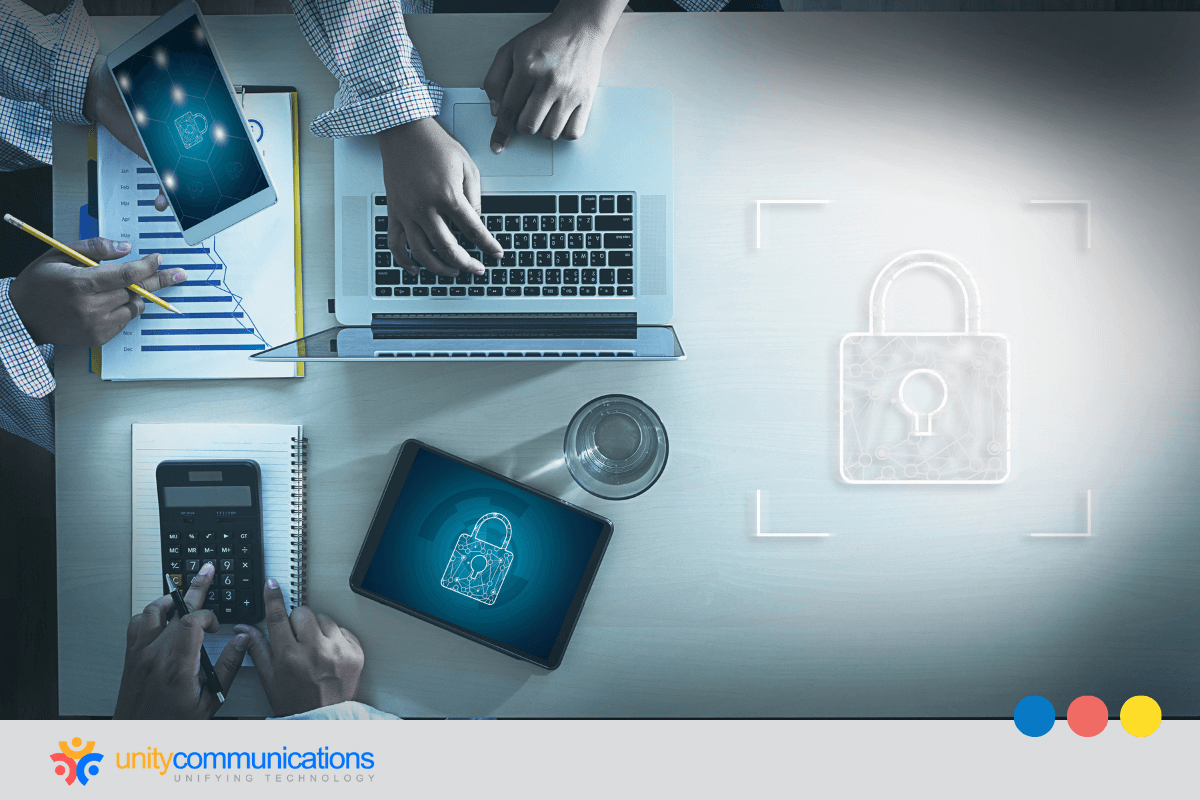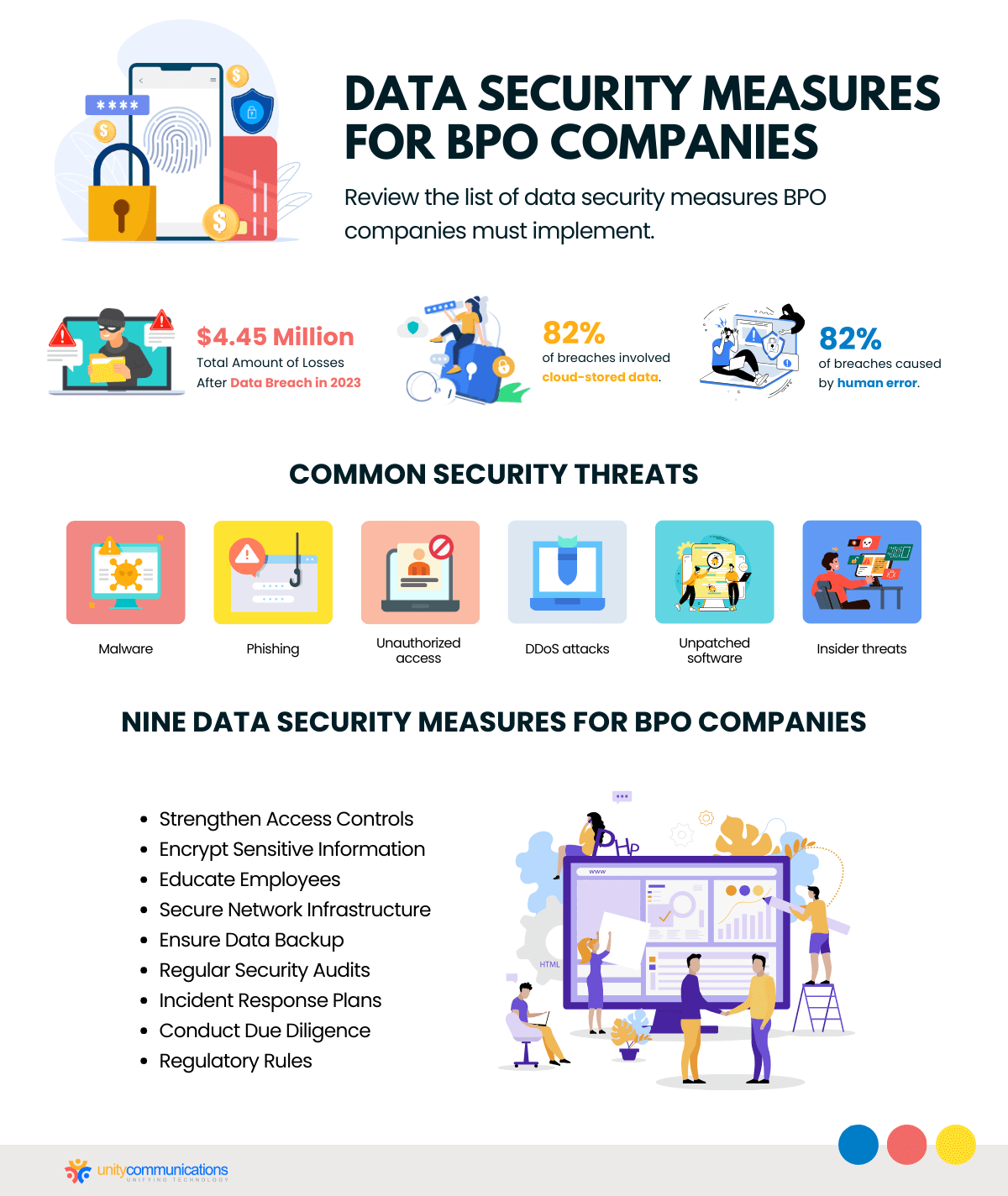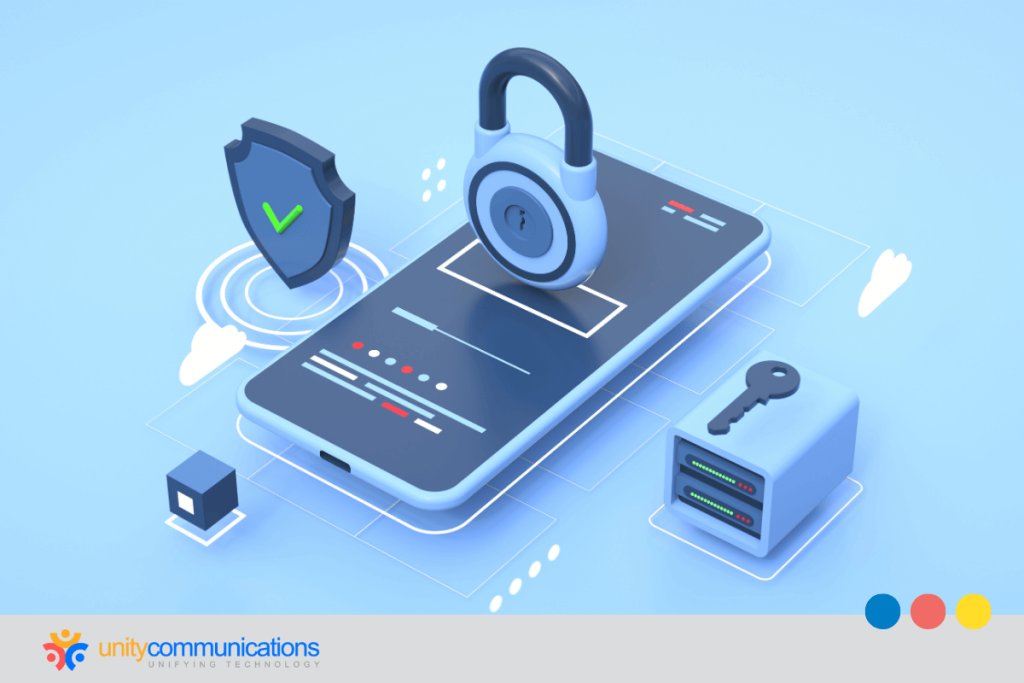IN THIS ARTICLE
Table of Contents
Many transactions now occur digitally, including work with your potential business process outsourcing (BPO) partner. Confidential business and customer data are prone to cyber threats if you let your guard down. Expect high mitigation costs and decreased customer trust to follow suit.
To avoid the hassle of dealing with such risks, pick a service provider that values information security as much as your organization. Ensure the vendor matches your approach to safeguarding data.
But how can you guarantee that?
Review this short list of data security measures that BPO companies must implement.
Importance of Data Security in BPO Companies

Ethical considerations in BPO, legal compliance of services, there are many considerations when outsourcing. However, with the massive data that companies now gather, BPO companies now also emphasize data security; it serves as a pillar of their excellent reputation and strong client trust. A robust data security strategy helps ensure long-term business relationships while minimizing the high costs of cyber risks.
According to IBM’s latest statistics, businesses lose $4.35 million on average after a data breach. The technology company also warned that tracking and resolving such an incident would take 277 days. However, IBM noted that addressing a breach within 200 days or less saves money.
Hence, top BPO companies implement strict security policies and procedures to safeguard your documents. Aside from data breaches, they monitor these common security threats and apply appropriate mitigation techniques whenever necessary:
- Malware attacks
- Phishing activities
- Unauthorized access controls
- Distributed denial-of-service (DDoS) attacks
- Unpatched software vulnerabilities
- Insider threats
Nine Data Security Measures BPO Companies Must Implement
After knowing the importance of data security in BPO companies, you must understand how a provider manages to survive a cyber threat before signing. As much as technology changes the BPO industry, malicious attacks also evolve.
While seeking the best BPO service provider, confirm whether it executes these nine key measures to secure data:
1. Strengthen Access Controls
Reliable service vendors prevent data loss by strengthening access controls. This action helps avoid unauthorized access to and distribution of sensitive data. BPO companies must use multifactor authentication and role-based access controls to ensure that only authorized personnel can access confidential information.
2. Encrypt Sensitive Information
Data encryption serves as a powerful data protection tool against breaches. Ensure your potential BPO partner employs encryption techniques to protect at-rest and in-transit data. These strategies include converting server or storage data into codes to prevent unauthorized access and utilizing secure communication protocols for data transmission.
3. Train and Educate Employees
Human error poses significant risks to any level of security. Verizon’s latest research shows that a human element causes 82% of data breaches. But providers with a good track record educate and train their employees. They know regular training sessions and awareness campaigns foster a security-conscious culture while working with clients.
4. Establish Secure Network Infrastructure
A robust network infrastructure is one of the most crucial data security measures BPO companies must implement. Frequent patching, system updates, and strong segmentation practices contribute to a secure network infrastructure.
5. Ensure Data Backup and Disaster Recovery
BPO companies must have data backup and disaster recovery procedures to solve the risks associated with unexpected data corruption. These efforts include syncing data to secure cloud storage and having a backup power source in case of a blackout. This action ensures data restoration during a breach, natural disaster, or system failure.
6. Perform Regular Security Audits
A trustworthy BPO partner performs regular security audits to identify vulnerabilities and compliance gaps that might affect your data, systems, and processes. These assessments help ensure up-to-date data security measures and prompt issue resolutions. You must also validate the provider’s ISO certifications to guarantee the safety of your classified data.
7. Draft Incident Response Plans
BPO companies that handle data security well must have incident response plans. These strategies are crucial for the effective management of security incidents. A well-structured plan includes clear roles and responsibilities, centralized communication channels, and post-incident reviews to improve future incident response capabilities.
8. Conduct Due Diligence
A well-founded outsourcing company does not immediately sign a service-level agreement (SLA); it performs due diligence when selecting a client. The provider evaluates your security practices and regulatory requirements, ensuring these provisions match its in-house rules.
9. Comply with Regulatory Rules
Credible BPO companies handle data in compliance with relevant security laws such as the General Data Protection Regulation (GDPR), the Health Insurance Portability and Accountability Act of 1996 (HIPAA), and the Payment Card Industry Data Security Standard (PCI DSS). As such, you avoid legal consequences and high violation costs while outsourcing.
Data Security Tools That BPO Providers Must Use

To triple the protection of your top-secret information, confirm whether BPO providers use the following data security tools: Make sure these solutions are compatible with your in-house security technologies and procedures, despite your varying time zones and locations:
- Firewalls
- Intrusion detection and prevention systems
- Antivirus software
- Encryption tools
- Data loss prevention software
- Vulnerability scanners
- Security information and event management platforms
- Secure file transfer tools
- Identity and access management solutions
- DDoS detection and mitigation systems
- Password management tools
- Mobile device management solutions
- Cloud-based virtual unified threat management tools
What Providers and Clients Must Do to Safeguard Data
Now that you know the data security measures BPO companies must implement, ensure you and your potential provider have a joint data protection plan. Aligning your strategies and solutions with the provider’s increases data protection threefold or even fourfold.
So as you explore what BPO is, ensure you only look for a service vendor with good industry standing and high trust ratings. Carefully discuss your security requirements and other important terms once you find the right provider. Before sharing necessary data, sign a non-disclosure agreement (NDA) alongside an SLA.
Upon closing a deal, monitor your provider’s compliance with security requirements and contractual obligations through audits and incident reporting mechanisms. Maintain open communication and exchange security updates and concerns to improve data security.
The Bottom Line

Outsourcing involves entrusting and sharing sensitive data with a third party. This data is vulnerable to cyberattacks because so much of your collaborative work occurs in virtual spaces. Fortunately, BPO providers have strategies and tools to defend your data against attacks.
From improving access controls to following compliance rules, vendors ensure the safe handling of your information while accomplishing outsourced tasks. But of course, you need to play your part and closely work with the service provider to strengthen security.
Are you seeking a trustworthy BPO partner? Contact us, and let’s connect. Unity Communications optimizes advanced solutions and executes vital measures to safeguard your classified data. The provider’s skilled personnel regularly train to ensure adherence to security protocols.





